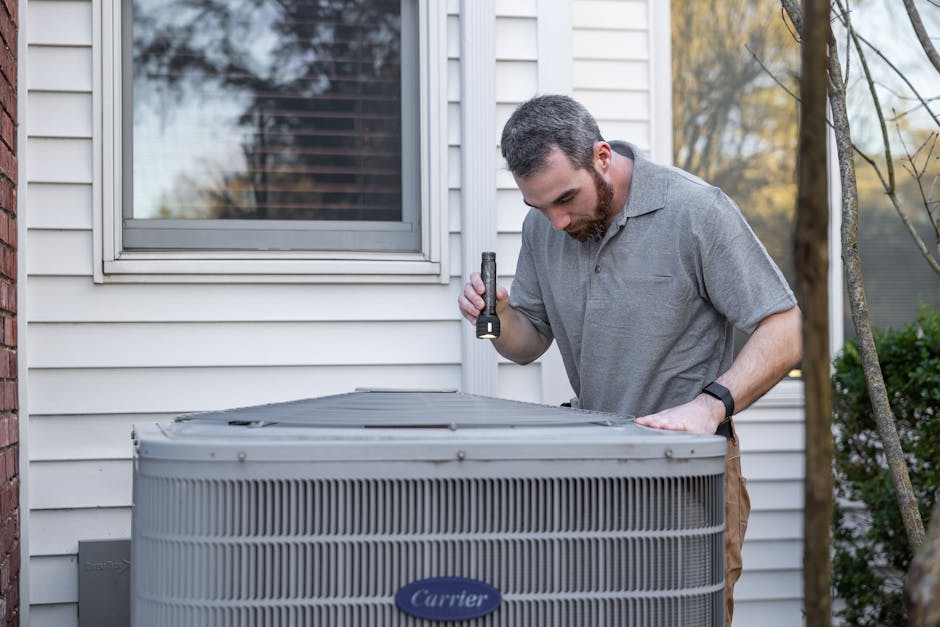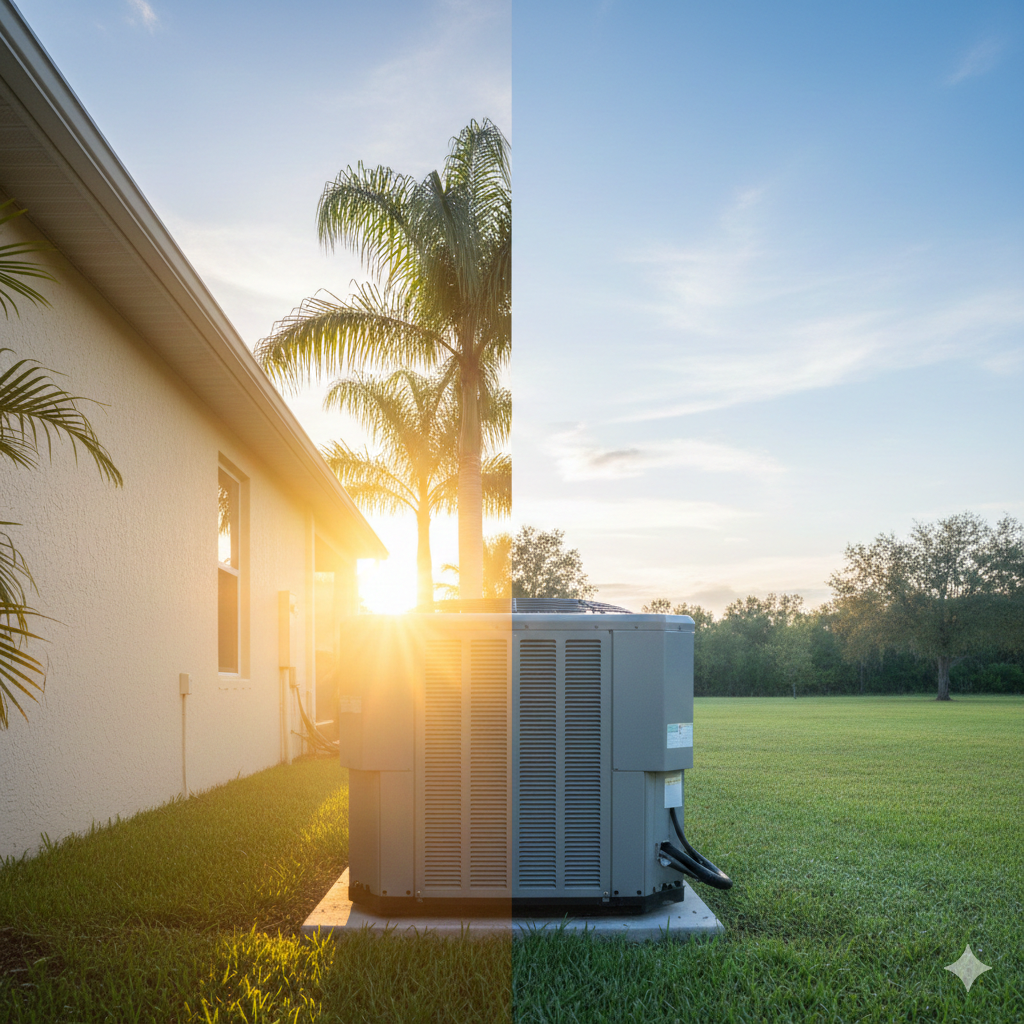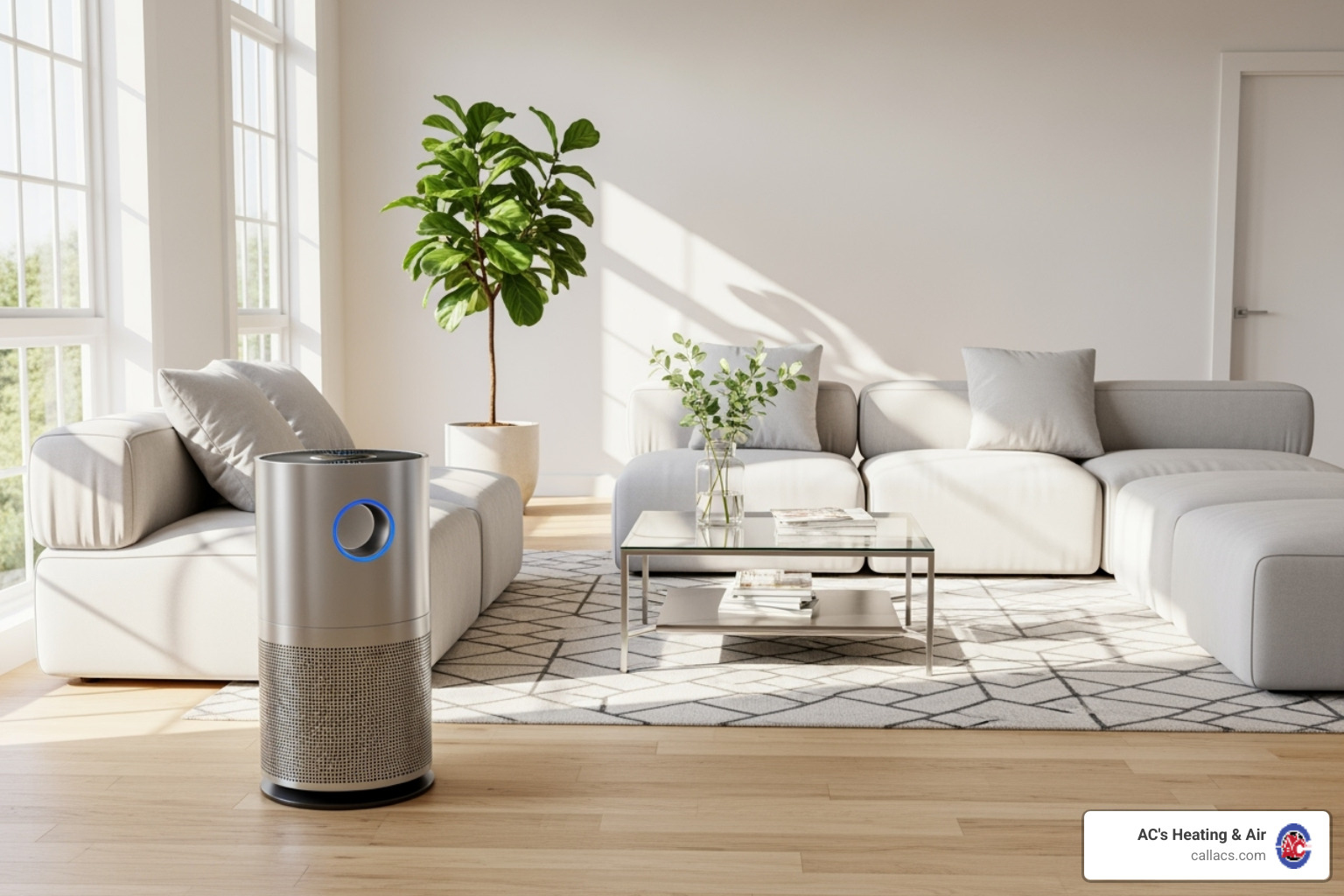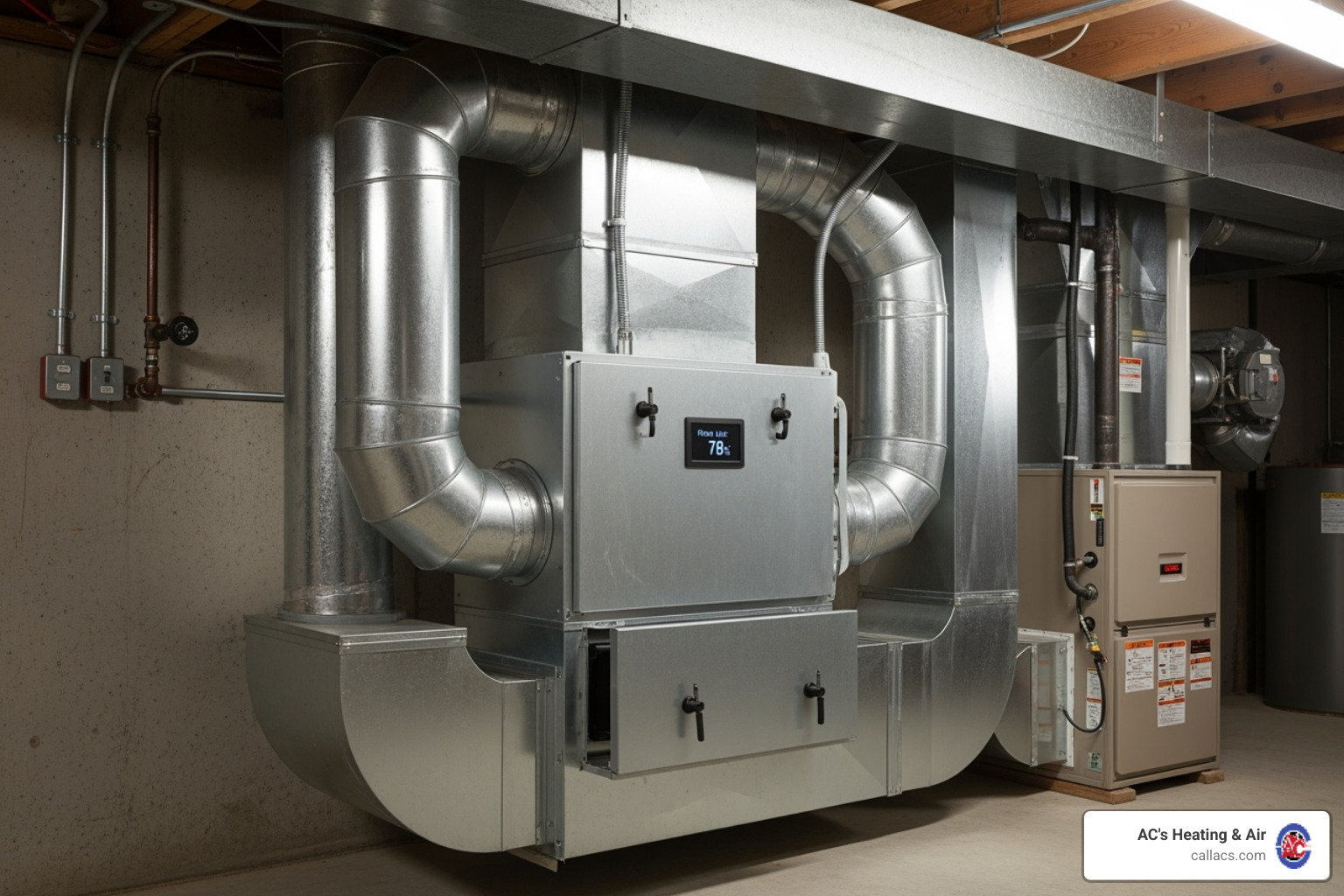Hot Mess at Home: What to Do When Your AC Blows Warm Air

Beating the Florida Heat When Your AC Won't
When my AC is blowing hot air in my house, it's more than just uncomfortable - it's a real problem that needs quick action. Here are the most common causes and what you can do:
Quick Diagnosis Checklist:
- Thermostat Issues - Check if it's set to "cool" mode and temperature is below room temp
- Dirty Air Filter - Replace if clogged (blocks airflow and can freeze coils)
- Blocked Outdoor Unit - Clear debris, grass, and vegetation around condenser
- Tripped Circuit Breaker - Reset breaker in electrical panel
- Frozen Evaporator Coils - Turn off AC and let ice melt completely
- Low Refrigerant - Requires professional repair (don't attempt DIY)
- Faulty Compressor - Needs professional diagnosis and replacement
Coming home to a hot house in Central Florida is the last thing you want after a long day. Your AC should be your reliable escape from the heat, not another source of stress.
The good news? Many causes of warm air from your AC can be fixed with simple troubleshooting steps. Others require professional help to avoid costly damage or safety risks.
I'm Allen Chenault, and in my 20+ years of HVAC experience serving Central Florida, I've seen countless cases where my AC is blowing hot air in my house turned into an expensive repair simply because homeowners didn't know what to check first. Let me walk you through the most effective solutions to get your cool air flowing again.

Quick my AC is blowing hot air in my house quick links:
First Response: Simple Troubleshooting Steps You Can Do Right Now
When my ac is blowing hot air in my house, your first instinct might be to panic and call for emergency service. But hold on - there are several simple checks you can do right now that might solve your problem immediately. These basic troubleshooting steps have saved countless homeowners time, money, and hours of discomfort.
Check Your Thermostat Settings
You'd be amazed how often I get service calls where the only problem is someone accidentally bumped the thermostat. Kids playing, purses swinging, or even just cleaning can change your settings without you realizing it.
Start by making sure your thermostat is set to "cool" mode instead of "heat" or "off." Next, check that the temperature setting is actually lower than your current room temperature - if it's set to 78°F and your house is 76°F, your AC won't kick on.
Look at your fan setting too. If it's set to "on" instead of "auto," your fan will blow continuously even when it's not cooling, which can make you think you're getting warm air when you're really just getting unconditioned air.
If your thermostat screen is blank or showing a low battery warning, try replacing the batteries. Sometimes it's really that simple! For more complex thermostat issues, check out our guide on AC Thermostat Not Working.
Inspect and Change Your Air Filter

A clogged air filter is hands down one of the most common culprits when my ac is blowing hot air in my house. When your filter gets packed with dust, pet hair, and debris, it chokes off airflow to your evaporator coils. This can cause those coils to freeze up, which completely prevents them from absorbing heat from your home.
Turn off your AC system first, then locate your filter. It's usually in the return air duct or inside your air handler. Pull it out and hold it up to the light - if you can't see through it, it definitely needs replacing.
Here's the thing about filters: they're cheap insurance for your expensive AC system. Most need changing every 1-3 months, but if you have pets, smokers, or family members with allergies, you might need to change them more often. A dirty filter doesn't just cause cooling problems - it can actually damage your compressor over time, as we explain in our article about Can Clogged HVAC Filter Damage Compressor.
Examine the Outdoor Condenser Unit
Your outdoor condenser unit is like the lungs of your AC system - it needs to breathe freely to work properly. If it's suffocated by debris, overgrown vegetation, or dirt buildup, it can't release heat effectively, leaving you with warm air inside.
Walk outside and take a look around your unit. You need at least two feet of clear space on all sides. Remove any leaves, grass clippings, or debris that's accumulated around the base. Check if any plants have grown too close or if storage items are blocking airflow.
Look at the metal fins on the condenser coils too. If they're bent or damaged, they can't transfer heat properly. Sometimes a simple cleaning can make a huge difference in performance.
If your outdoor unit isn't turning on at all, our guide on Air Conditioning Condenser Not Turning On can help you troubleshoot further.
Check the Circuit Breaker
AC units are power-hungry machines, and sometimes they draw more electricity than your circuit breaker can handle. If your outdoor unit suddenly stopped working, a tripped breaker might be the simple fix you need.
Head to your electrical panel and look for any breakers that are in the "off" position or sitting somewhere between "on" and "off." If you find a tripped breaker, turn it completely off first, then flip it back on.
Here's an important safety note: if the breaker trips again immediately after you reset it, stop right there and call a professional. This usually means there's a serious electrical problem that needs expert attention, not DIY fixes.
For more detailed help when your AC won't start up, check out our troubleshooting guide on AC Unit Is Not Kicking On.
Why My AC is Blowing Hot Air in My House: 7 Common Culprits
When my ac is blowing hot air in my house, it's usually one of several common issues that we see regularly in Central Florida homes. Understanding these culprits helps you figure out whether you're dealing with a quick fix or something that needs professional attention.
Let me walk you through the most frequent causes we encounter, so you can get a better sense of what might be happening with your system. For more comprehensive guidance, our AC Troubleshooting Tips and Central Air Conditioning Problems guides cover additional scenarios you might face.
Frozen Evaporator Coils

It might sound backwards, but ice on your AC is actually a major reason why you're getting warm air instead of cool relief. When evaporator coils freeze over, they can't absorb heat from your home's air anymore, which means your system just circulates whatever temperature air is already there.
You'll know you have frozen coils if you see ice visible on the indoor unit, notice reduced airflow from your vents, or find water pooling around your indoor unit. Your AC might keep running, but it won't actually cool anything down.
This freezing usually happens because of restricted airflow - often from that dirty air filter we talked about earlier. It can also result from low refrigerant levels, blocked return vents, or a malfunctioning blower fan.
If you find frozen coils, turn off your AC immediately and let everything thaw out completely before trying to restart. This thawing process can take several hours, but it's crucial for preventing damage. Our detailed guide on Air Conditioner Freezing Up explains the complete process and prevention tips.
Low Refrigerant Levels (Refrigerant Leak)
Your AC relies on refrigerant to move heat from inside your home to the outside. Think of it as the messenger that carries heat away. When refrigerant levels drop because of leaks, your AC loses its ability to cool effectively, even though it keeps running.
You might hear hissing or bubbling sounds coming from your system, which often indicates refrigerant escaping. You'll also notice your AC running constantly without actually cooling your home, and your electricity bills will likely spike since the system works harder to achieve nothing.
Here's something important to understand: refrigerant doesn't get "used up" like gas in your car. In a properly functioning system, refrigerant levels stay consistent. If they're low, there's definitely a leak somewhere that needs professional attention.
Never try to add refrigerant yourself. This is hazardous material that requires EPA certification to handle safely. If you suspect a leak, turn off your system and call us right away. Our article on AC Runs But Not Cooling covers more scenarios where your system runs without cooling effectively.
A Malfunctioning Compressor
The compressor is basically the heart of your AC system - it pressurizes the refrigerant and keeps it moving through the cooling cycle. When the compressor starts failing, your whole system struggles to do its job.
You'll typically hear loud clicking, rumbling, or grinding noises when the compressor has problems. Your AC might turn on and seem to run normally, but only warm air comes out. Sometimes the system cycles on and off frequently, or struggles to start up at all.
Compressor issues almost always need professional diagnosis because they involve complex mechanical and electrical components. The sounds alone can tell us a lot about what's going wrong. Check out our HVAC Compressor Troubleshooting guide for more details about identifying compressor problems.
Leaky Air Ducts
Even if your AC produces perfectly cold air, leaky ducts can make it seem like my ac is blowing hot air in my house. According to Energy Star research, duct leaks cause you to lose 20 to 30 percent of your conditioned air before it reaches your living spaces.
Meanwhile, warm air from unconditioned areas like attics or crawl spaces gets pulled into your system, mixing with the cool air and reducing its effectiveness. This creates a frustrating situation where your AC works fine, but you never feel comfortable.
Poor installation is often the culprit, along with normal wear and tear over time. Sometimes rodents damage ducts, or your home's natural settling disconnects joints. You might notice uneven cooling throughout your home, higher energy bills, or rooms that never seem to get comfortable.
If you're having trouble with specific areas not cooling properly, our guide on Air Conditioner Not Cooling Upstairs offers targeted solutions for common problem areas.
When to Stop DIY and Call a Professional HVAC Technician
When my ac is blowing hot air in my house, it's tempting to keep trying DIY fixes to save money. But sometimes, continuing to troubleshoot on your own can actually make things worse - and more expensive.
As much as I believe in empowering homeowners with knowledge, there's a clear line between what you can safely handle and what requires professional expertise. Crossing that line can put you at risk and potentially damage your system beyond repair.
For urgent situations, don't hesitate to contact our Emergency Air Conditioner Repair service. For general repair needs, our HVAC Repair team is ready to help.
You Suspect a Refrigerant Leak
Here's something many homeowners don't realize: working with refrigerant without proper EPA certification is actually illegal. Federal law requires anyone handling refrigerant to be EPA Section 608 certified, and there are good reasons for this requirement.
Refrigerant isn't just expensive - it's genuinely dangerous. Exposure can cause serious health problems including respiratory distress, dizziness, and headaches. Even small leaks can create hazardous conditions in enclosed spaces.
Beyond safety concerns, refrigerant problems require specialized equipment to diagnose properly. We use electronic leak detectors and other tools that most homeowners don't have access to. Simply "topping off" refrigerant without fixing the actual leak is like putting a band-aid on a broken pipe - it wastes money and harms the environment.
The real kicker? Incorrect refrigerant levels can damage your compressor, turning a moderate repair into a major replacement.
The System Has Electrical Issues
Electrical problems in AC systems are nothing to mess around with. If you're experiencing repeated breaker trips, burnt smells, or visible damage to electrical components, it's time to step back and call a professional immediately.
AC electrical systems are complex, involving high-voltage components like faulty capacitors, contactors, and specialized wiring. These parts can store electrical charges even when the system is off, creating shock hazards for untrained individuals.
I've seen too many cases where homeowners tried to fix electrical issues themselves, only to create bigger problems. What started as a simple capacitor replacement became extensive rewiring after incorrect connections damaged other components.
For thermostat-related electrical issues, our Thermostat Not Working guide can help you determine if the problem is with the thermostat itself or indicates deeper electrical issues that need professional attention.
The Compressor or Fan Motor Has Failed
When major components like your compressor or fan motor fail, you're looking at repairs that require specialized tools, extensive knowledge, and often expensive parts. These aren't weekend DIY projects.
Compressor and fan motor repairs typically involve electrical diagnosis, refrigerant handling, and precise component matching. The wrong part or incorrect installation can damage other system components, turning one repair into multiple expensive fixes.
These repairs also require proper system testing and calibration after installation. Without the right equipment and experience, you can't verify that everything is working correctly, which could lead to premature failure of the new components.
For specific fan issues, our guides on Air Conditioner Fan Does Not Turn On and AC Compressor Kicks On and Off But No Cold Air can help you understand what's happening, even if professional repair is needed.
There's no shame in calling for help. Professional HVAC technicians have the training, tools, and experience to diagnose problems quickly and fix them right the first time.
How to Prevent Your AC From Blowing Warm Air in the Future

The best way to avoid dealing with my ac is blowing hot air in my house is to prevent the problem before it starts. Think of it like going to the doctor for regular checkups - catching small issues early saves you from bigger, more expensive problems down the road.
After eight years of working on AC systems in Central Florida, I've seen too many homeowners spend thousands on repairs that could have been prevented with basic maintenance. A well-maintained AC unit doesn't just prevent breakdowns - it runs more efficiently, lasts longer, and keeps your energy bills lower.
Schedule Annual Professional Tune-Ups
Your AC system works hard, especially during Florida's brutal summer months. Professional maintenance gives your system the attention it needs to keep running smoothly year after year.
During a professional tune-up, we clean your evaporator and condenser coils to remove dirt and debris that blocks heat transfer. We check refrigerant levels and test for leaks before they become major problems. Our technicians inspect and tighten electrical connections that can loosen over time, and lubricate moving parts to reduce wear and tear.
We also test your thermostat calibration to ensure it's reading temperatures correctly, inspect your ductwork for leaks that waste energy, and check all safety controls and switches to keep your family safe.
For homeowners in our service area, our AC Maintenance Orlando service is designed specifically for Central Florida's unique climate challenges. We understand how the humidity, sand, and frequent storms affect your system.
Keep Up with Routine Filter Changes

If I could give homeowners just one piece of advice, it would be this: change your air filter regularly. It's the simplest thing you can do to prevent AC problems, yet it's the most neglected maintenance task.
Your household situation determines how often you need to change filters. A standard household should change filters every three months, but if you have pets, plan on every two months. Homes with multiple pets or family members with allergies need monthly changes, and if anyone smokes indoors, definitely change monthly.
During peak cooling season in Florida, I recommend checking your filter monthly regardless of your household type. The extra dust and pollen in our air can clog filters faster than you'd expect.
Keep the Outdoor Unit Clear
Your outdoor condenser unit is like the lungs of your AC system - it needs to breathe freely to work properly. Maintain at least two feet of clearance on all sides of your unit for proper airflow.
Trim vegetation regularly so it doesn't grow into your unit's space. Keep your gutters clean to prevent leaves and debris from blowing onto your condenser during storms. After severe weather, take a few minutes to remove any leaves, branches, or debris that may have accumulated around your unit.
Avoid the temptation to use the area around your outdoor unit for storage. I've seen units surrounded by lawn furniture, pool equipment, and holiday decorations - all of which block the airflow your system needs to operate efficiently.
Consider having your coils professionally cleaned annually, especially if you live near the coast where salt air can accelerate corrosion, or if you have large trees that shed leaves and pollen onto your unit.
Frequently Asked Questions About ACs Blowing Warm Air
Should I turn my AC off if it's blowing hot air?
Yes, you should definitely turn off your AC if it's blowing hot air. I know it's tempting to keep it running, hoping it'll magically start cooling again, but that's actually the worst thing you can do.
Running a malfunctioning system puts unnecessary strain on the compressor - the most expensive component to replace. It can also cause your evaporator coils to freeze, which creates a whole new set of problems that take hours to resolve.
Plus, you're essentially paying to heat your home while your AC works overtime trying to cool it. That's like running the heater and air conditioner at the same time - not exactly budget-friendly.
Turn off the system and work through the basic troubleshooting steps we covered earlier. If those don't solve the problem, that's when it's time to call in the professionals.
What are the signs of a refrigerant leak?
Refrigerant leaks are sneaky - they don't always announce themselves with obvious symptoms. But there are several telltale signs that my ac is blowing hot air in my house might be due to low refrigerant levels.
The most common sign is hissing or bubbling noises coming from your AC unit. This sound indicates refrigerant escaping from the system. You might also notice ice formation on your evaporator coils, which happens when low refrigerant causes the coils to get too cold.
Another dead giveaway is when your AC runs continuously but doesn't cool effectively. The system keeps trying to reach the temperature you've set, but without enough refrigerant, it simply can't get there. This leads to higher electricity bills as your AC works harder for less cooling.
If you notice any of these signs, turn off your system immediately and call a professional. Refrigerant isn't something you want to mess with - it requires special handling and EPA certification to repair safely.
What is the average cost to fix an AC that's blowing warm air?
The cost to fix an AC blowing warm air depends entirely on what's causing the problem. It's like asking "how much does it cost to fix a car that won't start?" - the answer could range from a simple battery replacement to a complete engine rebuild.
Simple fixes like replacing a thermostat or changing a clogged filter are usually the most affordable repairs. These straightforward solutions often resolve the problem quickly without breaking the bank.
Moderate repairs might involve refrigerant recharge, replacing electrical components like capacitors, or fixing minor wiring issues. These repairs require professional expertise but don't involve major system components.
Complex repairs like compressor replacement or major component failure are the most expensive. When you're looking at these kinds of repairs on an older system, it might make more sense to consider replacement instead. Our HVAC Replacement guide can help you decide whether repair or replacement is the better investment.
The good news is that many causes of warm air are on the simpler end of the spectrum. That's why it's worth trying those basic troubleshooting steps first - you might save yourself a service call altogether.
Get Your Cool Back with Professional AC Repair
When my ac is blowing hot air in my house, you don't have to suffer through another sweltering Florida day. At AC's Heating & Air, we've been helping Central Florida families get their cool back for years, and we know exactly how frustrating it can be when your AC decides to take a vacation during our hottest months.
Our experienced technicians have seen it all - from simple thermostat mix-ups to complex compressor failures. We arrive with the tools, knowledge, and parts needed to diagnose your problem quickly and get your system running properly again. No guesswork, no unnecessary delays, just expert service that gets results.
We proudly serve communities throughout Central Florida, including Orlando, Winter Park, Apopka, Winter Garden, and the surrounding areas. Whether you're dealing with a midnight breakdown or planning preventive maintenance, our team is ready to help restore the comfort your family deserves.
Don't let a small problem turn into an expensive disaster. Many of the costliest AC repairs we see could have been prevented with prompt attention and regular maintenance. When your system starts blowing warm air, it's often your AC's way of asking for help before something major breaks down.
Emergency situations demand immediate attention, and routine maintenance keeps problems from becoming emergencies in the first place. Either way, we're here to help you make the right choice for your home and budget.
Contact us for professional repair services and let us get your AC back to doing what it does best - keeping your home cool and comfortable. Your peace of mind is worth the call, and we're ready to prove why so many Central Florida families trust us with their home comfort needs.



